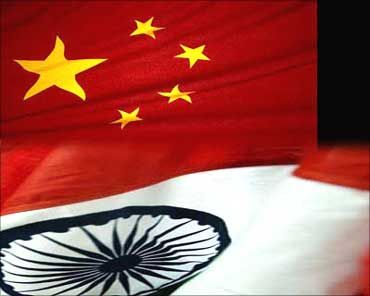 There should be no "shame" in entering another market via an indirect route if that would lead to faster success at a lower risk, Anil K Gupta (below left) tells Rohit Nautiyal.
There should be no "shame" in entering another market via an indirect route if that would lead to faster success at a lower risk, Anil K Gupta (below left) tells Rohit Nautiyal.
What is the fundamental idea on which your latest book The Silk Road Rediscovered is based?
Haiyan Wang (co-author) and I have been doing research, writing and consulting on topics related to China and India for over 10 years. Girija Pande (co-author) was, until recently, chairman, Asia Pacific for TCS.
Thus, all three of us came to this subject with deep exposure to the big picture as well as the ground-level realities.
In my view, the timing of this book is just about right. India needs to launch an infrastructure revolution just like China did starting in the mid-1990s.
This will require large amounts of capital as well as machinery - whether for building roads or power plants or ports. China has an abundance of both.
Importantly, Chinese machinery is not only less expensive than that from the US, Europe or Japan, often it also comes with lower-cost financing.
Thus, from the Indian side, having Chinese suppliers and banks will help accelerate the country's development.
From the Chinese side, the picture looks like a mirror image. The Chinese economy is slowing down.
Chinese companies, therefore, have an even stronger motivation than before to look outside China for growth opportunities.
When they look around the world, India clearly emerges as the most attractive opportunity. India is, and for the next couple of decades will, remain one of the world's largest and fastest growing economies among the G-20.
 In the book you say that going for a JV or acquiring an American, European or any other strong foreign brand is one of the best ways to enter China, especially for Indian companies. What exactly do the Indian companies lack - credibility or technology?
In the book you say that going for a JV or acquiring an American, European or any other strong foreign brand is one of the best ways to enter China, especially for Indian companies. What exactly do the Indian companies lack - credibility or technology?
The answer varies across sectors. Indian companies have very strong credibility in China in the IT sector.
More than one Chinese mayor has talked about transforming his/her city into China's Bangalore. However, there are very few other sectors where one can say the same thing.
Take the auto sector. China's auto sector is about five times as large as India's.
Also, no Indian auto brand (including Tata or Mahindra) is well-known globally.
Thus, as a country, India does not enjoy a strong national brand the way it does in the IT sector. Within India itself, Tata Motors has a very weak position in passenger vehicles.
Thus, notwithstanding the massive global strengths of the Tata Group, it is hard to imagine how Tata Motors could ever hope to succeed in China with a direct assault on the market.
However, as we know, Tata Motors has succeeded in China by adopting the indirect route - by leveraging the brand and technological strengths of Jaguar and Land Rover.
Mahindra Group is now attempting the same thing by leveraging its Korean subsidiary Ssangyong.
As a strategist, I tend to look at global expansion from a pragmatic lens. There should be no "shame" in entering another market (including China) via an indirect route if that would lead to faster success at a lower risk.
After all, once Tata Motors acquired Jaguar Land Rover, these became Tata brands just as surely as "Tata" or "Taj Hotels" and so forth.
Other than manufacturing, what else can Chinese companies sell to the world on a large scale?
Also, as wages increase in China, many companies are moving their manufacturing units to lower-cost destinations such as Vietnam and Bangladesh. How fast do you see this happening?
Chinese costs are rising for two reasons - a steep hike in wages and a rising currency. Over the next decade or more, I see both trends continuing. As a consequence of the one-child policy, China's labour pool is shrinking; thus, wages have nowhere to go but up. Similarly, even with a slowdown, I expect China's economy to keep growing faster in the next decade or more. After the US, Europe and Japan, in the long run, we should also expect China's currency to get stronger.
Both of the above trends are leading MNCs to shift labour-intensive manufacturing out of China to places such as Vietnam, Bangladesh, Indonesia and India.
The speed of shift depends on two factors: how labour intensive the manufacturing is and how much does the MNC depend on the Chinese market.
If the Chinese market is important, the MNC is likely to keep manufacturing in China. It may either shift to a lower cost inland location or go heavily for automation.
Chinese companies are also broadening the scope of sectors where they can play on the global stage.
Infrastructure project management is one such sector. Chinese companies have built expertise in areas such as building hydroelectric dams, deep sea ports, high speed rail networks and so forth.
Chinese companies are also becoming global competitors in some service sectors such as airlines and banking.
Air China now has a massive global network and much lower costs than its competitors. Also, Chinese banks such as ICBC (Industrial and Commercial Bank of China) and China Development Bank enjoy a lower cost of capital and thus can compete effectively in certain segments of merchant banking outside China.
How comfortable are Indian leaders while thinking about collaborating with state-owned Chinese companies?
Large Indian corporates such as the Tata Group, Mahindra, Reliance Industries and others are comfortable in working with Chinese state-owned enterprises (SOEs).
It is important to remember that alliances even between two purely private sector companies are always a mixed motive game.
There is an element of collaboration but also an element of competition.
Thus, even when an Indian company (for instance, Wipro) collaborates with a highly reputed Western company such as GE, one has to watch one's back.
Just as with any other potential partner, when collaborating with a Chinese SOE, it is critical for the Indian company to understand what's driving the Chinese company to work on the deal.
Chinese partners respect due diligence and pragmatism. So, there is no reason for an Indian company to shy away from asking all relevant questions.
THE MASTERMIND
Gupta is among the only three professors out of 25,000 worldwide to be elected a Lifetime Fellow of three prestigious academic bodies: Academy of Management, Strategic Management Society & Academy of International Business
He is an elected member of the board of directors of Origene Technologies (a gene cloning company).
He has earlier served on the boards of directors of Omega Worldwide, Vitalink Pharmaceutical Services, NeoMagic Corporation, and TiE-DC, an organisation of entrepreneurs and venture capitalists in the US












 © 2025
© 2025